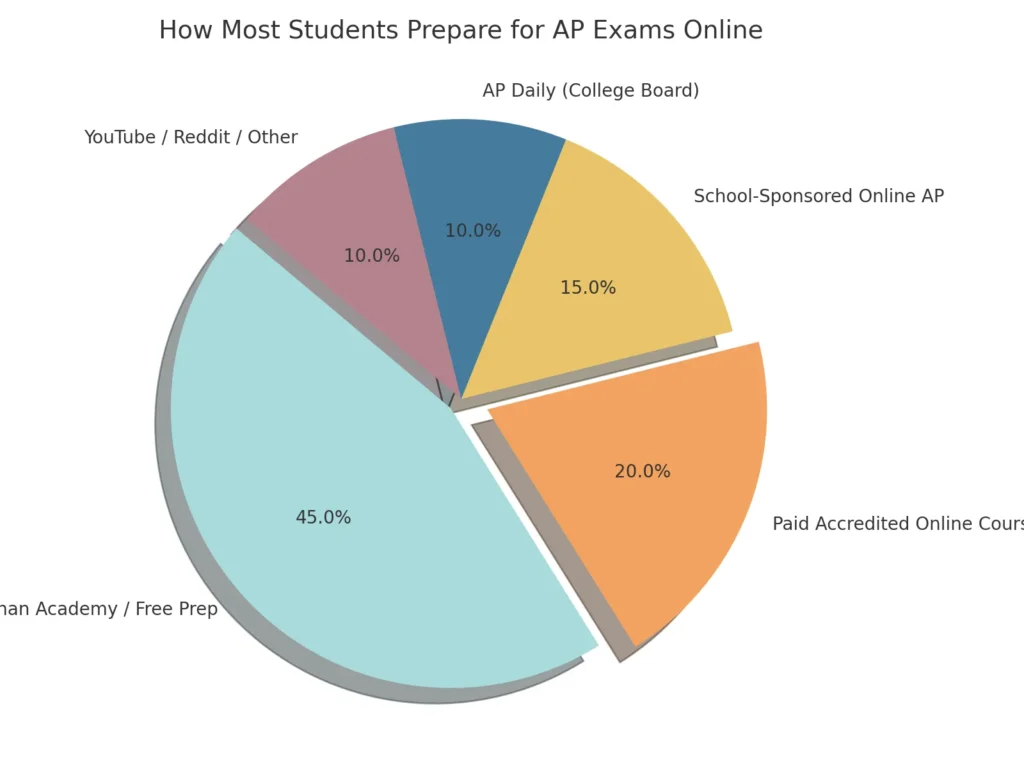Yes, you can take AP (Advanced Placement) classes online through accredited platforms. These courses follow College Board standards and may earn you college credit after taking the AP exam.
More students are turning to online options than ever before. In fact, after 2020, online AP enrollment jumped across homeschool, private, and even public school students. Why? Flexibility. Access. And honestly… it just works better for some kids.
You can take AP classes online in 2025 — through accredited programs that follow the same College Board-approved curriculum as in-person classes.
And yes, if you pass the AP exam, you can still earn college credit. Doesn’t matter whether you studied in a school building or your bedroom.
In my opinion? If your school doesn’t offer a certain AP, or you learn better at your own pace, online AP might be your best move.
Want to plan your AP year? Check the official 2026 AP exam schedule here.
Quick Checklist: Is Online AP Right for You?
- Your school doesn’t offer the AP subject you want
- You’re homeschooled or learning outside a traditional setting
- You need a more flexible or self-paced schedule
- You’re motivated and can stay on track without daily teacher check-ins
- You plan to take the AP exam for college credit
In my opinion? If you checked 2 or more of these, online AP might be worth a serious look.
who are online AP classes actually for?
- Students at schools that don’t offer specific APs
- Homeschoolers who want to level up their curriculum
- Rural or international students with limited access
- Students who need flexibility (athletes, performers, frequent movers)
- Advanced learners who want to get ahead or graduate early
Real example: A Reddit user on r/APStudents shared how they took AP Psychology online because their school didn’t offer it. They still got a 5 — and college credit.
Start with the best AP classes that are flexible and online-friendly — our student-approved AP list can help.
What’s the difference between online and in-person AP?
Here’s what most students miss: the content is the same, but the structure is totally different. Online classes are usually self-paced or lightly guided. There’s more independence. Less daily pressure. But also less hand-holding.
Some platforms have weekly live sessions or check-ins. Others just give you the materials and deadlines. It depends where you enroll.
Feature: In-Person AP vs Online AP
| Feature | In-Person AP | Online AP |
|---|---|---|
| Teacher | Daily in-class teacher | Varies – live sessions or self-paced |
| Schedule | Follows school calendar | Flexible, some year-round |
| Interaction | In-person peers, class discussion | Mostly virtual, sometimes solo |
| Exams | Taken at school | Still taken at a school or test center |
| Who It’s For | Students with full AP access | Homeschoolers, rural areas, advanced learners |
he College Board’s Role
The College Board doesn’t teach the classes — it just approves them. They publish the curriculum framework, set the exam schedule, and run the official AP exam each May.
What they do offer online:
- Free AP Daily videos
- Practice questions
- My AP Classroom dashboard (your online AP ho
Where Can You Take Accredited AP Courses Online?
Not all online AP courses are created equal. Some follow the College Board’s guidelines to the letter. Others? Not so much. That’s why it’s important to choose a provider that’s College Board–approved — so you’re actually prepared for the exam.
Here are five solid options students commonly use in 2025:
1. K12
One of the largest online school networks in the U.S. Offers AP classes to students enrolled in K12-powered public and private schools.
- Great for: Students enrolled in online high schools
- Structure: Semester-based, teacher-led
- Website: k12.com
2. Apex Learning Virtual School
Known for flexibility and wide course selection. Offers both full-time enrollment and individual course enrollment.
- Great for: Independent learners or part-time AP students
- Structure: Self-paced with teacher support
- Website: apexlearningvs.com
3. VHS Learning
A nonprofit virtual school that offers over 20 AP courses. Classes are interactive, with weekly assignments and peer discussions.
- Great for: Students who want a structured, class-like feel online
- Structure: Teacher-led, paced weekly
- Website: vhslearning.org
4. Northwestern CTD
Offers AP classes through their Center for Talent Development. Known for academically advanced offerings.
- Great for: Gifted or high-achieving students
- Structure: Teacher-led, structured by academic terms
- Website: ctd.northwestern.edu
5. PA Homeschoolers
Specifically created for homeschoolers taking APs. Courses are taught by experienced AP teachers — many of whom were AP graders.
- Great for: Homeschool families looking for proven support
- Structure: Varies by course/teacher
- Website: pahomeschoolers.com
Pro Tip: Make sure the course you choose is College Board authorized.
If it’s not, it might not fully prepare you for the AP exam — even if it “looks official.”
→ You can double-check a course’s status here: AP Course Audit Site
Comparison Table: Top Online AP Course Providers
| Provider | Cost Range | AP Subjects Offered | Format | Enrollment Periods |
|---|---|---|---|---|
| K12 | Varies (by state/school) | 15+ | Semester, teacher-led | Follows school year |
| Apex Learning | ~$700–$1,000 per course | 15+ | Self-paced | Rolling |
| VHS Learning | ~$525 per course | 25+ | Weekly-paced, teacher-led | Fall/Spring |
| Northwestern CTD | ~$975 per course | 10–15 | Teacher-led, structured | Term-based |
| PA Homeschoolers | ~$500–$900 per course | 25+ | Teacher-led (varies) | Varies by course |
Here’s what most parents miss: Some of these platforms don’t offer textbooks or exam registration — you’ll still need to handle that on your own. Don’t assume it’s “all included.”
Do Online AP Classes Affect GPA?
It depends — and yeah, that answer’s frustrating. But the truth is, how online AP classes impact your GPA varies by school.
Some high schools give weighted GPA credit (like that extra +1.0 bump for AP classes) only if the course is taken through their own program. Others are more flexible and will accept an accredited outside AP class, as long as it’s pre-approved by a counselor.
Real quote from Reddit:
“My online AP didn’t count for weighted GPA but still looked good on apps. Colleges cared more about the exam score anyway.” — r/APStudents
What if you’re homeschooled?
If you’re homeschooling, you (or your parent/teacher) create the transcript — so technically, yes, you can assign AP credit. But you should do it right.
- Make sure the online AP course is College Board approved
- List the course clearly as “AP [Subject] – Online via [Provider]”
- Include the final grade and AP exam score (if available)
According to HSLDA.org, it’s best to include a course description or attach a syllabus from the provider in your homeschool portfolio — especially if the course wasn’t part of a formal online school.
In my opinion, homeschoolers should always keep receipts: course syllabi, enrollment confirmation, and instructor details. Some colleges want to see that the AP wasn’t just self-labeled.
key points:
- Public school student? Ask your counselor if online APs can be weighted. Every district is different.
- Private school? Depends on school policy — some are more flexible.
- Homeschooler? You can include AP courses, but be ready to document everything.
Will Colleges Accept Online AP Courses?
Short answer? Yes.
Colleges don’t care how you took the AP class — they care how you did on the exam.
As long as the course follows the College Board’s official curriculum and you sit for the AP exam (which is always in-person), your score holds the same value, whether you took it online, in school, or self-studied in your basement.
What if things don’t go as planned? Here’s what happens if you fail an AP and how to bounce back.
Link: Failing an AP Exam: What Happens Next?
What really matters to colleges?
- Your AP exam score (usually a 4 or 5 is ideal for credit)
- How the class shows up on your transcript
- Course rigor — were you pushing yourself, or coasting?
Here’s what most parents miss: colleges look at context. If your school doesn’t offer many APs and you go out of your way to take one online, that shows initiative. Schools like that.
“Do colleges prefer in-person AP over online?”
Not really. As long as your online course is legit (meaning College Board–approved) and your performance is strong, there’s no penalty for taking it online.
In fact, some admissions officers have said in blogs (like on Unigo or Crimson) that online APs can even show extra motivation, especially for homeschoolers or students in under-resourced schools.
“Don’t worry about whether it’s online or in-person. What matters is how you handle the workload — and whether you actually learned something.”
— Advice seen on college admissions blog
Tip: You’ll still report your APs on the Common App or mention them in platforms like Unigo when listing test scores or coursework.
Can You Take AP Classes Online for Free?
Yes — sort of. You can access free AP prep online, but if you’re looking for a full, accredited AP course that prepares you from start to finish, most of those come with a price tag.
Let’s break it down.
Free AP Options (Kinda Free)
- Khan Academy: It’s 100% free and super popular with students. You’ll get high-quality video lessons, practice quizzes, and review guides — especially useful for self-studying. But keep in mind: it’s not an official AP course, and you won’t get credit on your transcript.
💬 “Khan Academy carried me through APUSH and AP Bio — I didn’t even use a textbook.”
— Reddit user in r/APStudents
- Public school online offerings: Some school districts (especially after 2020) offer free AP classes online to enrolled students. But they’re usually only free if you attend that school or district — not open to everyone.
- AP Daily (via College Board): These are short video lessons that walk through the AP framework for each subject. Super helpful, but again — they’re meant to supplement, not replace a full course.
On a budget? Start planning with this free AP study schedule maker—templates included.
Paid Options: What’s the Cost?
Most fully accredited online AP courses cost anywhere from $500 to $1000+ per course, depending on the provider. These are ideal if:
- You’re homeschooled and want an official course
- Your school doesn’t offer a certain AP subject
- You want teacher guidance, grades, and a transcript
Some popular providers include:
- Apex Learning
- K12 Online Schools
- PA Homeschoolers
- VHS Learning
- Northwestern CTD
Free vs Paid Online AP Class
let’s be clear through pie-chart.

Pricing Comparison
| Type of Course | Cost | Includes Transcript? | Who It’s Best For |
|---|---|---|---|
| Khan Academy (Prep Only) | Free | ❌ | Self-studiers, budget learners |
| AP Daily Videos (College Board) | Free | ❌ | Students in AP classes needing extra review |
| School-Sponsored Online AP | Free (if enrolled) | ✅ | Public school students |
| Apex / K12 / PA Homeschoolers | $500–$1000+ | ✅ | Homeschoolers, independent learners |
In my opinion? If you’re serious about taking the AP exam and need structure, it’s worth investing in a full course. But if you just want to self-study, start with Khan Academy — it’s free, easy to use, and surprisingly effective.
Common FAQs About Online AP Courses
Can I take AP classes online over the summer?
Yes, you can — but not everywhere. Some platforms offer accelerated summer AP courses that cover a full year of material in just a few months. It’s intense, but doable if you stay focused.
Only go this route if you’re seriously self-motivated. Otherwise, it can feel overwhelming fast.
Can I take an AP exam without the class?
Yes. That’s called self-studying, and it’s totally allowed. Tons of homeschoolers and independent learners do this every year.
You’ll still need to register for the exam through a local school’s AP coordinator, even if you never set foot in their building.
Real advice from Reddit:
“I self-studied AP Environmental Science with just a Barron’s book and practice tests. Got a 4.” — r/APStudents
More on this from College Board’s official guide to exam sign-up.
How do I prepare for AP exams if I’m online?
You’ve got options — even without a teacher physically in front of you.
Watch free AP Daily videos (they’re actually good!)
Use official practice questions from College Board
Join study groups on Discord or Reddit
Try Quizlet sets made by past students (search by course + year)
Quick tip: Don’t just watch — take notes like you would in a live class. It sticks better.
Are online AP classes harder?
That depends on you. If you’re self-motivated, organized, and okay with less hand-holding, online APs can actually be easier. But if you struggle without structure, they might feel harder.
In a school setting, the teacher pushes you. Online? You have to push yourself.
“The content isn’t harder — it’s the time management that gets people.” — Student comment on Quora
Didn’t get the score you wanted? You might be able to retake your AP exam—here’s how it works.
Should You Take AP Classes Online?
So… are online AP classes worth it? Honestly, it depends on you.
They’re awesome if you’re the type who likes working at your own pace, doesn’t mind figuring things out, and just needs the flexibility. I’d recommend them for:
- Homeschoolers
- Students with packed or weird schedules
- Anyone whose school doesn’t offer the AP course they want
- Independent learners who don’t need constant reminders
But heads up — they’re not for everyone. You might want to think twice if:
- You need that face-to-face interaction to stay focused
- Your internet or tech setup is spotty
- You tend to procrastinate (hey, no shame — it happens!)
Here’s what most students miss:
Online APs can totally work — but only if you treat them seriously. If you’re motivated and willing to stay on track, they can open doors to college credit you might not get otherwise.
You May Also Like” Box (After Final Verdict)
- AP Exam Schedule 2025
- How to Self-Study and Score a 5
- IB vs AP vs Dual Enrollment
- Failing an AP Exam: What Now?

Nawab, an educator teaching K-12 since 2010, holds an English honors graduate degree and a diploma in elementary education. He has also been blogging for five years, sharing insights for educators and parents.

